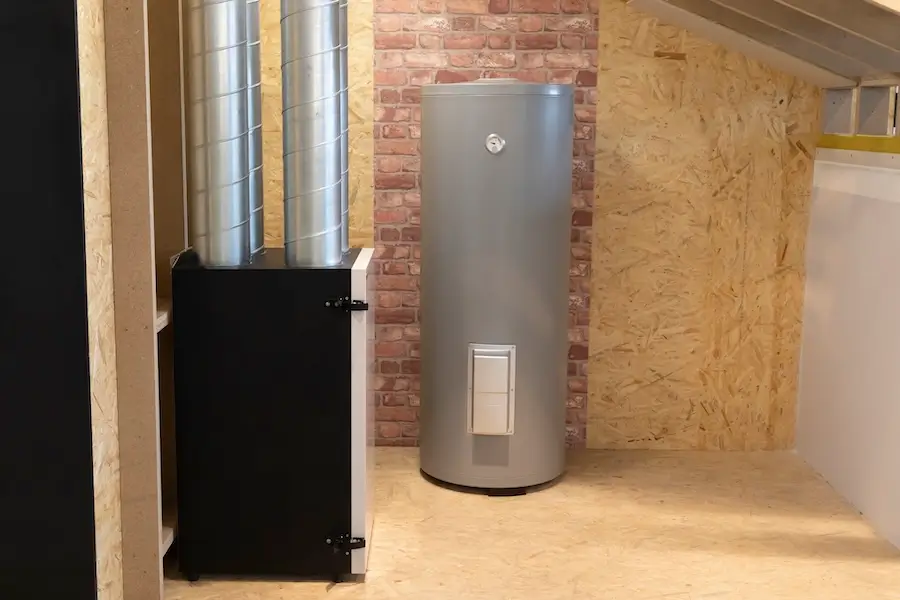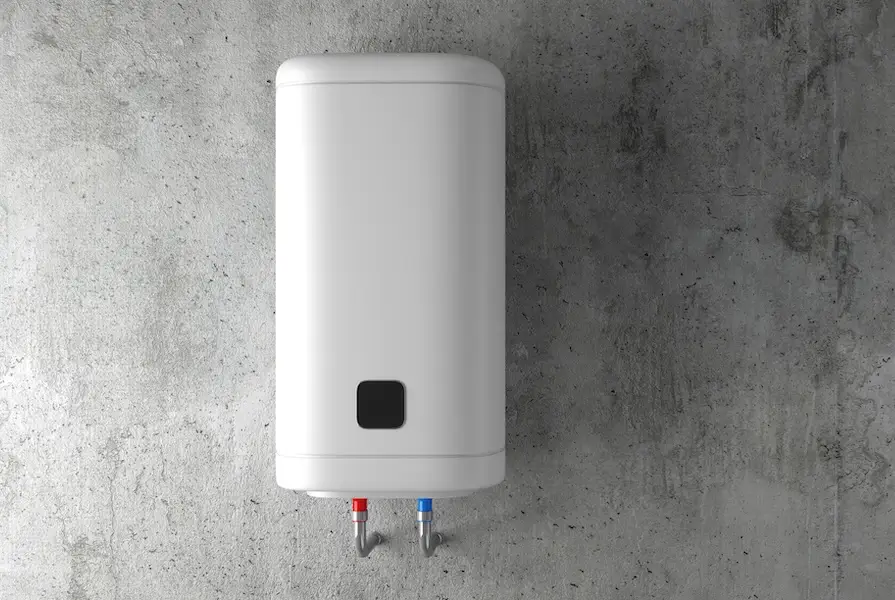
Mr. Rooter Plumbing® provides insight into tank and tankless water heaters.
|
There is much to consider when weighing up the options for receiving hot water in your home or business. You have to consider whether you have space for a tank water heater or prefer the space savings of a tankless hot water heater. You must also explore the pros and cons of various models, such as an electric tankless water heater compared to a gas water heater.
With so many options on the market, it’s not a decision to make lightly. In this guide, we can help you learn more about the available options so you can make your choice with confidence.
Tankless Water Heater vs. Tank Water Heater
Before exploring energy sources to provide hot water to your home or business, consider whether you prefer a tank or tankless hot water heater. Both have advantages and disadvantages that are worth keeping in mind.
Tank Water Heaters

A tank water heater, also known as a storage tank water heater, stores hot water in a tank until it’s used. Once used, the hot water is replaced with cold water, which is then heated by an electric or gas element within the water heater.
Tank water heaters are available in different sizes to suit various household needs. Most tank hot water heaters are available as gas, electric, and hybrid systems. They are usually less expensive to purchase compared to tankless hot water heaters. However, they are also often less efficient.
If you’re considering installing a tank water heater, learning about its many pros and cons can be helpful, ensuring you make the right purchase for your property.
Pros
- Inexpensive to buy and install
- Consistent flow rate with no minimum flow rate
- Straightforward maintenance and repairs
- Instant hot water
- Trusted, long-standing technology
Cons
- Heat loss through the tank walls
- Shorter lifespan compared to tankless water heaters
- They can develop leaks and corrosion
- Higher utility bills
- Limited water output - demand can exceed capacity
Tankless Water Heaters

Tankless hot water heaters, also known as on-demand water heaters, don’t have storage tanks. Instead, they provide hot water on demand. When you turn on a hot water faucet, cold water flows through the water heater’s gas or electric heating element, with the water being heated instantly.
As there is no large tank to store heated water, water is just heated on demand. Your property occupants never have to worry about running out of hot water!
Tankless instant water heaters can be more expensive to purchase upfront, but they are generally more energy-efficient than tank models, which means you can save money on your energy bills. If you’re thinking about installing a tankless water heater in your property, consider these pros and cons:
Pros
- Energy-efficient - they only heat the hot water you need
- Continuous hot water supply
- Space-saving design without a large supply tank
- Longer lifespan than tank water heaters
- Reduced risk of water leaks and subsequent damage
Cons
- Higher purchase price and installation costs
- Limited hot water flow rate
- Potential for inconsistent temperatures at multiple outlets
- No hot water with a power outage
- More challenging installation process
Heat Pump Water Heaters
When exploring water heater replacement, your research may guide you toward heat pump water heaters. Many property owners consider this type of water heater for its sustainability, energy efficiency, and cost-saving benefits.
Heat pump water heaters use heat pumps to transfer heat from the air to water. Compared to traditional electric heaters, they are a more energy-efficient option.
Choosing An Energy Source
A tankless water heater versus a tank water heater is just one part of the decision-making process. You also have to decide how you wish to power your hot water heater. Some water heaters are designed to run with some energy sources over others. Availability of some energy sources can also be better in some areas than in others.
Electric
Electric water heaters are among the most common options in Canada and use electric heating elements to raise the temperature of the water. They come in a range of sizes, require no venting, and are straightforward to install. However, tank electric water heaters can take a great deal of time to reheat, and they can’t supply hot water during a power outage.
Natural Gas
Whether you have a tank or tankless hot water heater, you can heat your water using natural gas. A variety of water heaters on the market rely on natural gas. They can be vented through a wall or chimney and require airflow for combustion. If the model you choose has a continuous pilot light, you can enjoy hot water during a power outage.
Propane
If you don’t have access to natural gas, but would prefer that your water heater work with gas, you can purchase a model that runs on propane. However, propane hot water heaters need a dedicated storage tank, and you have to schedule regular fuel delivery.
Oil
While less common than gas, propane, and electric water heater models, oil water heaters are available in limited models and types. Oil water heaters must be vented through a wall, and they need airflow for combustion. They also don’t work during power outages and require a storage tank and regular fuel delivery.
Solar
You don’t have to immediately jump into purchasing an electric tankless water heater, a propane tankless hot water heater, or another type right away. You can explore alternative options, such as a solar domestic hot water system. These systems enable you to harness energy from the sun to heat your water. Most systems generate 60% of the hot water needed in an average home, depending on the climate and the property’s hot water needs.
How to Choose the Right Water Heater - On Demand or Tank
How you heat your property’s water supply is not a decision to make lightly. Some people prefer the convenience of a tankless instant water heater for endless hot water, while others like the cost-effectiveness of a traditional tank electric water heater. If you’re still not sure which option is right for you, consider these factors:
- The water usage of your household
- The availability of fuel types in your area
- Energy efficiency
- Available space
- Expected installation costs
- Maintenance requirements
- Lifespan
- Ease of use
Contact Mr. Rooter Plumbing® for Water Heater Replacement, Repairs, and New Installations
If you need more information about tank and tankless water heaters, the knowledgeable team at Mr. Rooter Plumbing® is here to answer your questions. We can also take care of all your water heater repair, replacement, and new installation needs. Contact us to request a job estimate today.

